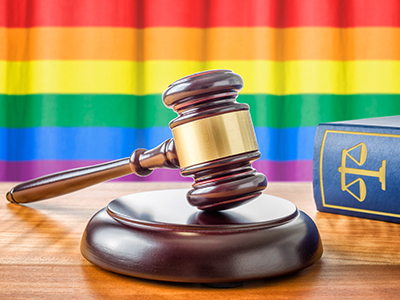
On April 22, 2019, the U.S. Supreme Court granted certiorari in a trio of employment discrimination cases for which the Court’s forthcoming rulings—expected to be published by June 2020—could ultimately settle whether Title VII of the Civil Rights Act of 1964 prohibits employment discrimination on the basis of sexual orientation and gender identity. The three cases that the high court agreed to hear are Bostock v. Clayton Cnty. Bd. of Comm’rs, No. 17-1618 (filed May 25, 2018), Altitude Express, Inc. v. Zarda, No. 17-1623 (filed May 29, 2018), and R.G. & G.R. Harris Funeral Homes v. Equal Employment Opportunity Commission, et al., No. 18-107 (filed July 20, 2018). The first two cases involve sexual orientation specifically, while the third case pertains to gender identity.
At issue for resolution is the split in federal judicial circuits’ interpretations of Title VII’s provision that prohibits discrimination against an individual “because of such individual’s … sex.” Until 2017, Courts of Appeals around the country had held that Title VII does not apply to sexual orientation-based discrimination. Since 2017, both the U.S. Courts of Appeals for the Second and Seventh Circuits, sitting en banc, overruled panel decisions, and now conclude that the phrase “because of sex” encompasses sexual orientation, thereby making discrimination based thereon unlawful. In Zarda, the Second Circuit interpreted Title VII’s proscription on sex-based discrimination to bar sexual orientation discrimination. It did so over the current administration’s Department of Justice’s (DoJ) opposition via amicus brief, in which the DoJ broke with the Equal Employment Opportunity Commission (EEOC), taking the opposite position that the EEOC has consistently held in years past. In fact, the EEOC, an independent government commission, continues to maintain its position that Title VII protects both sexual orientation and gender identify.
In Harris Funeral Homes, a case involving claims of discrimination by a transgender employee, the Supreme Court limited its review to “[w]hether Title VII prohibits discrimination against transgender people based on (1) their status as transgender or (2) sex stereotyping under Price Waterhouse v. Hopkins, 490 U.S. 228 (1989).” In Harris Funeral Homes, the DoJ again filed a brief contrary to the EEOC’s position and asserted the argument that Title VII does not protect gender identity.
Some commentators have pointed to recent changes in the Supreme Court’s composition—in particular, the replacement of Justice Kennedy with Justice Kavanaugh—as signaling that the Court will not interpret Title VII as covering discrimination based on sexual orientation or gender identity. On the other hand, the Court could find that sex stereotyping of transgendered employees is covered under Title VII vis-à-vis the well-entrenched Price Waterhouse precedent. While many employers maintain policies forbidding discrimination based on sexual orientation and gender identity, a decision not interpreting Title VII protections to cover those bases would cut off many claims at the federal level. However, the Supreme Court decision would neither affect many of the protections afforded to employees of most federal contractors nor employees in states and other jurisdictions that afford workplace protections. Further, the Court’s opinions could have an impact on federal agencies’ treatment of gender identity and sexual orientation in the context outside of Title VII employment discrimination. For example, where this administration’s agencies might tie certain benefits or services to an individual’s “sex” by defining sex as biological traits assigned at birth (as the U.S. Department of Health and Human Services did in late 2018), a Supreme Court ruling that “because of sex” includes sexual orientation and/or gender identity could impact federal agencies in many other areas. As always, our Orrick employment law team will continue to provide updates on these developments in the law.

